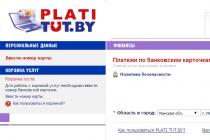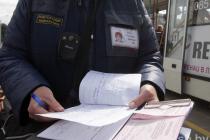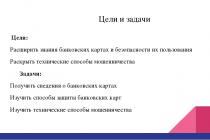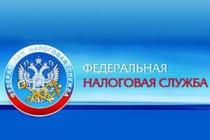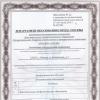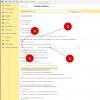Every accountant knows how important it is to correctly arrange a business trip, fill out all travel documents, and check the correctness of accounting for travel expenses for tax purposes. Recommendations will help you, as well as a selection of letters from regulatory authorities on the topic of business trips.
Other business trip expenses
The regulatory authorities do not object to the inclusion of the following costs in expenses (the condition is that compensation for such expenses is established in the local regulatory act of the organization and there is an order from the head of the organization for compensation):
- Payment for airport VIP lounge services (Letters of the Ministry of Finance of the Russian Federation dated 03/05/2014 No. 03-03-10/9545; dated 09/10/2013 No. 03-03-06/1/37238);
- Cost of booking a hotel room, fee for ordering and returning tickets (Letter of the Ministry of Finance of the Russian Federation dated October 18, 2011 No. 03-03-06/1/672);
- Payment for renting a car for an executive while on a business trip (Resolution of the Federal Antimonopoly Service of the West Siberian District dated January 23, 2006 No. F04-9850/2005(19018-A27-15)).
- Amounts for taxi travel to and from the place of business trip, including to the airport, train station, as well as directly at the place of business trip (Letters of the Ministry of Finance of Russia dated June 14, 2013 No. 03-03-06/1/22223, dated June 27, 2012 No. 03-11-04/2/80, dated 07/11/2012 No. 03-03-07/33, dated 11/08/2011 No. 03-03-06/1/720). Taxi costs are taken into account in expenses provided that they are economically justified (for example, early arrival/departure, etc.). Confirmation of taxi expenses: a cash register receipt or a receipt in the form of a strict reporting form with the details provided for in the Decree of the Government of the Russian Federation of February 14, 2009 No. 112 “On approval of the Rules for the transportation of passengers and luggage by road transport and urban ground electric transport.”
- Payment for travel while on a business trip for travel on public transport within the boundaries of a populated area, but the Regulations on business trips of the organization do not provide for reimbursement of these expenses. However, according to regulatory authorities, such costs can be taken into account as part of travel expenses. To do this, the collective agreement or other local regulatory act of the organization must provide for the employer’s obligation to reimburse the employee’s travel expenses on public transport if they are due to the purpose of the business trip (Letters of the Ministry of Finance of Russia dated July 21, 2011 No. 03-03-06/4/80, Federal Tax Service of Russia dated July 12, 2011 No. ED-4-3/11246).
- Service (commission) fee of the intermediary organization, expenses for registration and issuance of visas, passports, vouchers, invitations and other similar documents(Letter of the Federal Tax Service of Russia for Moscow dated July 1, 2010 No. 16-15/069225@).
What costs are risky to charge as income tax expenses?
First. Payment for voluntary health insurance policies against accidents when purchasing air and railway tickets, which are annex to these tickets for posted workers.
The costs of voluntary insurance against accidents in air and railway transport for posted workers can also be taken into account as travel expenses if the collective agreement or local regulations provide for reimbursement of these expenses.
The method of processing the payment of insurance premiums (on the basis of a separate insurance policy, which is an appendix to the ticket, including the amounts of contributions in the cost of the travel document) is not of fundamental importance. At the same time, tax authorities may not agree with this method of accounting for the costs of voluntary insurance against accidents in air and railway transport when calculating the tax base for income tax.
Second. Expenses incurred by an employee in connection with travel by personal car to the place of business trip and back (which include expenses for fuel and lubricants) and compensated to him, for income tax purposes can be taken into account only within the limits established by the Decree of the Government of the Russian Federation dated 02/08/2002 No. 92 “On establishing standards for the expenses of organizations for the payment of compensation for the use of personal cars and motorcycles for business trips, within which, when determining the tax base for corporate income tax, such expenses are classified as other expenses associated with production and sales” (Letter of the Federal Tax Service RF dated May 21, 2010 No. ШС-37-3/2199).
Third. Daily allowance paid to an employee sent on a long business trip (more than six months).
Opinion 1: if employees perform most of the working time and most of the labor duties stipulated by the employment contract in a foreign country, the actual place of work of the employees will be in a foreign country and such employees cannot be considered to be on a business trip (Letters of the Ministry of Finance of the Russian Federation dated April 28 .2010 No. 03-03-06/1/304, Federal Tax Service of Russia for Moscow dated September 30, 2010 No. 16-15/102339@).
Opinion 2: the period of stay on a business trip is determined by the employer, taking into account the volume, complexity and other features of the official assignment (Regulation on the peculiarities of sending employees on business trips, approved by Decree of the Government of the Russian Federation of October 13, 2008 No. 749) and is not limited to the maximum limit. Consequently, regardless of the duration of the business trip, the employer has the right to take into account in income tax expenses in terms of daily allowance payments the entire amount established in the local act of the organization (Resolution of the Moscow District Arbitration Court dated September 23, 2015 No. F05-12177/2015 No. A40-167292 /2014).
Fourth. Costs of living for a posted employee at the place of assignment in a rented apartment, but the costs are not documented.
However, there is judicial practice, which, as an alternative, allows the amount of 700 rubles to be taken into account in expenses. (across Russia) or 2,500 rubles. (on foreign business trips) (Resolutions of the Fifth Arbitration Court of Appeal dated December 11, 2009 No. 05AP-5540/2009 in case No. A59-2701/2009; FAS North-Western District dated February 9, 2007 in case No. A26-5126/2006-28, Fourteenth Arbitration Court of Appeal dated June 2, 2008 in case No. A05-4612/2007).
Sixth. The organization hired an employee of the counterparty to carry out the work and reimbursed him for travel and other travel expenses. According to the clarification of the Ministry of Finance of Russia (Letter No. 03-03-06/1/54684 dated September 24, 2015), reimbursement of travel expenses to individuals who are not employees of the company are not taken into account in income tax expenses due to the fact that the trip of a third-party specialist is not considered a business trip .
Register for the course "". You will learn how to keep records of income without errors, reflect expenses and determine the tax base for income tax. And also calculate and pay advance payments and taxes, submit reports, create an ideal accounting policy.
Accounting for travel expenses in 2018-2019 has its own characteristics. Let's consider what documents an accountant should use in order to correctly calculate and take into account business trip expenses.
Accounting for travel expenses: calculation and registration
Many companies and individual entrepreneurs, in the course of their activities, are faced with the need to send employees on trips away from their place of permanent work in order to carry out certain assignments. Such a trip is called a business trip (Article 161 of the Labor Code of the Russian Federation). At the same time, the employer is obliged to preserve for the posted worker his job, average earnings, and also compensate for the costs incurred by him, the list of which is established by law.
In order to correctly and reasonably account for travel expenses, the accountant must have properly executed documents confirming the fact of the business transaction.
Accounting for travel expenses can be divided into 2 main stages:
- preliminary calculation and issuance of money on account to the business traveler;
- approval of the employee’s advance report on the amounts spent.
In order to pay an advance to an employee for business trip expenses, the accountant needs to calculate it based on 2 internal documents:
- an order or instruction from the manager to send a company employee on a business trip, which indicates the employee’s full name, duration and purpose of the trip (to perform a work assignment);
- a written decision of the manager on an employee’s trip on a business trip using official or personal transport (if accepted).
Based on what is written in these two local documents, as well as the business travel regulations developed and adopted by the company, the accountant calculates a cash advance, which includes:
- the cost of tickets for travel to and from the business trip;
- payment for hotel accommodation;
- daily allowance for each day you are on a business trip;
Read about whether to pay an employee a daily allowance for travel days if the ticket includes meals. “A business trip ticket includes meals - should the employee be paid per diem for days on the road?” .
- other expenses permitted by management.
The daily allowance does not depend on travel and housing costs. This separate expense item is defined as the funds needed to perform work and stay during a business trip (for food).
Daily allowances are not limited by law, and every commercial organization has the right to establish their amount by internal act. At the same time, you need to remember that there is a limit above which personal income tax must be calculated and withheld from the employee, as well as insurance premiums must be calculated. In 2018-2019, this limit is 700 rubles. per day for business trips in Russia and 2,500 rubles. - for business trips abroad.
Daily allowances are paid for all days on a business trip, including weekends and non-working holidays, as well as travel days and forced stops (clause 11 of the regulation on the specifics of sending employees on business trips, approved by Decree of the Government of the Russian Federation of October 13, 2008 No. 749). The employee does not need to report for the use of daily allowances.
Other expenses may include expenses for mobile communications, the Internet, and payment for goods and services necessary for work.
The employee receives an advance at the organization's cash desk or by non-cash transfer to a card and, before the end of 3 days after returning to his permanent place of work, reports to the accounting department for the money received.
IMPORTANT! For accounting of travel expenses in 2018-2019, there is no need to issue a travel certificate and official assignment (Resolution of the Government of the Russian Federation dated December 29, 2014 No. 1595). Approval of the report on money spent will need to be made on the basis of the documents provided by the employee and in accordance with the regulations on business trips adopted by the organization.
However, many companies, in order to minimize the risks of controversial situations with tax authorities, still continue to use the previous rules for processing travel expenses. Since, for example, if an employee uses his own vehicle and it is impossible to confirm the date of departure and arrival with travel documents, the service note, in the opinion of the Ministry of Finance, will not be a document confirming the length of stay on a business trip (letter of the Ministry of Finance dated April 20, 2015 No. 03-03-06 /22368). Consequently, inspectors may have questions related to the amount of daily allowance. And if a travel certificate is issued with marks of arrival/departure, then disputes can be avoided.
Accounting for expenses on foreign business trips
A business trip abroad is processed in the same way as in Russia, only it has some features:
- Additional expenses are added for obtaining a visa, a foreign passport, consular and other fees necessary for traveling abroad (subclause 12 of Article 264 of the Tax Code).
- The daily allowance limit, exempt from personal income tax and contributions when traveling to another country, is 2,500 rubles.
- When traveling abroad, the time for calculating daily allowances is determined by travel documents, and in case of their absence, by travel documents or by supporting documents of the receiving party (clause 7 of the regulations on business trips No. 749).
- Primary documents drawn up in a foreign language must be translated into Russian (clause 9 of the Accounting Regulations, approved by order of the Ministry of Finance of the Russian Federation dated July 29, 1998 No. 34n).
If an employee purchased currency on his own, then when drawing up a report he must attach certificates of purchase. If such a certificate is not available, then the expenses will be recalculated at the rate of the Central Bank at the time of receipt of accountable money (clauses 5, 6, 7 of PBU 3/2006).
After the report is approved:
- the balance of the advance, returned in foreign currency, is credited to the cash desk with conversion into rubles at the official exchange rate on the date of receipt of money;
- overexpenditure made in foreign currency is issued to the employee in rubles, recalculated at the exchange rate on the day the advance report is approved.
For daily allowances in foreign currency, that part of them that is subject to personal income tax must be recalculated into rubles at the rate on the last day of the month in which the advance report was approved (letter of the Ministry of Finance dated November 1, 2016 No. 03-04-06/64006).
IMPORTANT! If the company’s local regulatory act specifies the amount of daily allowance in foreign currency and pays the employee in rubles, then there is no need to recalculate (letter of the Ministry of Finance dated April 22, 2016 No. 03-04-06/23252).
Travel expenses under the simplified tax system “income minus expenses”
When sending an employee on a business trip, the organization uses the simplified tax system to calculate travel expenses in the same way as under the OSNO. Having reimbursed the employee for all travel expenses stipulated by law, the enterprise has the right to reduce its income by them for tax purposes, subject to documentary confirmation and economic justification of the expenses incurred (subclause 13, clause 1, article 346.16 of the Tax Code of the Russian Federation).
A distinctive feature is the date on which travel expenses are included in expenses. Since accounting for expenses on the simplified tax system is carried out on a cash basis, the date of recognition of expenses is considered to be the date of approval of the advance report. However, if the employee has spent his own funds and the company reimburses him for them, the reimbursed payments should be included in the book of income and expenses at the time of issuing money from the cash register (Clause 2 of Article 346.17 of the Tax Code of the Russian Federation).
One more nuance. According to the Ministry of Finance, an individual entrepreneur without employees on a simplified basis cannot take into account the costs of his own trips. The department justifies this position as follows: a business trip is a trip by an employee at the direction of the employer. But an individual entrepreneur does not have an employer, just as he cannot be his own employee (letters from the Ministry of Finance dated 02/26/2018 No. 03-11-11/11722, dated 07/05/2013 No. 03-11-11/166). The courts, as a rule, do not agree with such conclusions (Resolution of the Federal Antimonopoly Service of the Far East of Russia dated August 22, 2011 No. F03-3248/2011).
Read more about recognizing expenses under the simplified tax system in the material “Acceptable expenses under the simplified tax system in 2018 - 2019” .
Reflection of travel expenses in accounting
An approved advance report - in Form AO-1 or an independently developed form - with documents attached to it confirming expenses incurred in the interests of the company will serve as the basis for reflecting these expenses in accounting.
The accountant, when checking the advance report, makes an adjustment calculation of daily allowance (if the business trip was shorter or longer than planned) on the basis of travel tickets, from which he takes the departure date and return date. The departure day is considered to be the current day if the departure time on the tickets is before 24:00 inclusive, and the next day is from 00:00.
REMINDER! If the trip was made by personal transport, then the daily allowance is calculated according to the waybill and accommodation invoices, according to which the accountant can track the date of arrival and departure to calculate the day on a business trip.
If there are no travel documents, as well as papers confirming the fact of residence at the place of business trip, the employee provides an official note about the actual length of stay on the business trip, confirmed by the record of the receiving party. The responsible person of the organization to which the employee was sent must put a mark on the date of arrival and departure (clause 7 of the Regulations on business trips dated October 13, 2008 No. 749).
If an employee has used official or personal transport and needs compensation for its use and gasoline, then he must submit a memo, a waybill that calculates the mileage traveled, and attach invoices and receipts for the purchase of fuel. The possibility of reimbursement of such expenses should be provided for in the accounting policy.
Housing rental documents confirming payment must also be checked: checks, receipts, rental agreement, receipt from the owner of the house or apartment. During the verification, the amount actually paid and confirmed is taken into account and approved.
Accounting entries for travel expenses
Let's consider what entries in 2018-2019 for accounting for travel expenses are provided for by the Chart of Accounts.
On the day an advance is issued to an employee for a business trip, the following entry is made:
Dt 71 Kt 50, 51 - money was paid for travel expenses.
After approval of the expense report, entries will be made in accordance with the distribution of the amounts spent according to their purpose:
Dt 20, 23...44 Kt 71 - daily allowance, travel tickets (without VAT), hotel bill (without VAT);
Dt 19 Kt 71 - VAT for travel and housing is reflected;
Dt 68 Kt 19 - accepted for deduction of VAT for transport and accommodation;
Dt 20, 44, 91-2, 08, 10... Kt 71 - other expenses are taken into account;
Dt 50 Kt 71 - return to the organization’s cash desk the balance of the advance;
Dt 71 Kt 50 - compensation for overruns.
At the end of the month the following posting is possible:
Dt 70 Kt 68 - personal income tax is withheld from daily allowances exceeding the limit.
What transactions and in what cases need to be made when issuing an advance for business trips, read the article “Issued as a report for travel expenses - posting” .
Results
The organization's expenses - on travel, housing, daily allowances and others approved by management - the company has the right to attribute to expenses and reduce the tax base. The accountant should take a responsible approach to checking the report so that the inspection authorities do not have any doubts or questions.
Travel expenses are expenses that are incurred by an accountable person at the expense of the enterprise. In this article we will look at how such expenses are accounted for in accounting and tax accounting.
The employer's obligation is to reimburse expenses for business travel. This is stated in Article 168 of the Labor Code of the Russian Federation and the Regulations on the peculiarities of sending employees on business trips, approved by Decree of the Government of the Russian Federation of October 13, 2008 N 749.
A business trip is a trip by an employee by order of the employer for a certain period of time to carry out an official assignment outside the place of permanent work.
Before sending an employee on a business trip, he is given a cash advance.
The basis for calculating and paying an advance to an employee are two internal documents:
- an order or instruction from a manager to send a company employee on a business trip, which indicates the employee’s full name, duration and purpose of the trip (to perform a work assignment);
- a written decision from the manager about an employee traveling on a business trip using official or personal transport (if accepted).
The advance is calculated based on the following costs:
- the cost of tickets for travel to and from the business trip;
- payment for hotel accommodation;
- daily allowance for each day you are on a business trip;
- other expenses, as authorized by management.
Per diem is a separate type of expense; it does not depend on travel and housing costs.
There are no legal restrictions on the amount of daily allowance. Commercial organizations have the right to establish their size by their internal act.
However, there is a limit above which personal income tax must be calculated and withheld from the employee. In 2017, the limit is 700 rubles per day for business trips in Russia and 2,500 rubles for business trips abroad.
The same limits have been in effect since 2017 when paying insurance premiums (clause 2 of Article 422 of the Tax Code of the Russian Federation).
Daily allowances must be paid for all days on a business trip, including weekends and non-working holidays, as well as travel days and forced stops (clause 11 of the Regulations on the specifics of sending employees on business trips, approved by Decree of the Government of the Russian Federation of October 13, 2008 No. 749). You do not need to provide any documents confirming your daily allowance.
The advance is issued in cash through the company's cash desk or by transfer to a bank card. Within 3 days after returning to his permanent place of work, the employee must report to the accounting department for the money received.
Please note that in 2017, on the basis of Decree of the Government of the Russian Federation dated December 29, 2014 No. 1595, you do not have to issue a travel certificate and official assignment.
For the report, the employee provides an advance report, in form AO-1 or in a form independently developed by the enterprise. Documents confirming the expenses incurred (tickets, hotel documents, checks, etc.) are attached to the report.
If travel to and from the business trip was carried out by personal or official transport, you must provide a memo, a waybill, which is used to calculate the mileage traveled, and attach invoices and receipts for the purchase of fuel. The possibility of reimbursement of these expenses should be reflected in the accounting policies of the organization.
Enterprises using the simplified tax system (“income minus expenses”) calculate travel expenses in the same way as under the general system and accept them as expenses.
But the date on which business travel amounts are included in expenses may vary.
Expenses for the simplified tax system are recognized as they are paid. If the employee was given an advance, then these travel expenses will be reflected in the simplified tax system expenses as of the date of approval of the advance report, subject to the provision of supporting primary documents.
1. How to pay an employee for business travel days and calculate daily allowances.
2. In what order are travel expenses reimbursed?
3. How to reflect travel expenses in tax and accounting.
The need to send an employee on a business trip can arise for a variety of reasons: participation in negotiations, concluding an agreement with a counterparty, purchasing property, etc. You can read more about which employee trips are recognized as business trips and the procedure for documenting them in the previous article. However, correctly filing a business trip is only half the battle: for an accountant, the “expenses” component of a business trip is of particular interest. The fact is that any business trip is inevitably associated with additional costs, which include, for example, travel and accommodation costs for the employee at the place of business trip. In addition, during a business trip, the employee is entitled to payment calculated in a special manner. This article will focus on payments related to business trips, their accounting reflection and taxation.
An employee sent on a business trip is entitled to the following payments:
- payment for days spent on a business trip;
- daily allowance;
- reimbursement of expenses incurred during a business trip (travel, accommodation, etc.).
An example of calculating payment for a business trip
Alpha LLC sent its employee Ivanov A.V. on a business trip from February 8 to 14, 2015, with February 8 (the day of departure on a business trip) and February 14 (the day of return from a business trip) falling on Sunday and Saturday, respectively. Alpha LLC has a 5-day work week. During the billing period (from February 1, 2014 to January 31, 2015) Ivanov A.V. was on vacation from August 4 to 17, 2014, as well as on sick leave from December 8 to 12, 2014, the remaining months of the billing period were fully worked. Ivanov A.V. The salary was set at 30 thousand rubles, there were no additional payments in the billing period.
- Salary for months not fully worked was:
- For August 2014: RUB 15,714.29. (RUB 30,000 / 21 days x 11 days)
- For December 2014: RUB 23,478.26. (RUB 30,000 / 23 days x 18 days)
- The amount of payments taken into account to calculate average earnings for the billing period was:
- RUB 339,192.55 (RUB 30,000 x 10 months + RUB 15,714.29 + RUB 23,478.26)
- Number of days worked in the billing period:
- 230 days (245 – 10 – 5)
- Average earnings for working days of a business trip:
- RUB 7,373.75 (RUB 339,192.55 / 230 days x 5 days)
- Payment for days off that fall on business trips (double without providing time off):
- RUR 6,315.79 (RUB 30,000 / 19 days x 2 x 2 days)
- Total payment for business trip days:
- RUB 15,164.29 (RUB 7,37.75 + RUB 6,315.79)
From the amount of payment for days spent by the employee on a business trip, Personal income tax is withheld, and insurance premiums are also calculated in the same manner as with wages.
Daily allowance
When sending an employee on a business trip, the employer is obliged to reimburse him for additional expenses associated with living outside his place of permanent residence - daily allowance (Article 168 of the Labor Code of the Russian Federation). Daily allowances are paid for each calendar day of being on a business trip, including weekends and non-working holidays, as well as days spent on the road (clause 11 of the Regulations on the specifics of sending employees on business trips). How the actual duration of a business trip is determined, and what documents confirm it, is discussed in the article.
Each employer sets the specific amount (rate) of daily allowance paid to posted workers independently in the relevant local regulations (for example, in the Regulations on Business Travel). It is advisable to separately indicate the amount of daily allowance for business trips within the Russian Federation and separately for business trips abroad. Moreover, for for foreign business trips, daily subsistence allowances are paid:
- for the day of departure from the Russian Federation - according to the norms for business trips abroad;
- per day of entry into the Russian Federation - according to the standards for business trips within the Russian Federation.
The date of departure from the Russian Federation and entry is confirmed by border crossing marks in the international passport or travel documents (for CIS countries).
! Note: When sending an employee to one-day business trip
- (when the day of departure on a business trip and the day of return coincide) daily allowance:
- are not paid if the business trip is carried out within the Russian Federation (clause 11 of the Regulations on the specifics of sending employees on business trips);
are paid in the amount of 50% of the norm for business trips abroad, if the business trip is carried out outside the Russian Federation (clause 20 of the Regulations on the specifics of sending employees on business trips). Personal income tax is not withheld from daily allowances not exceeding 700 rubles. for each day of a business trip in the Russian Federation and 2500 rubles. for each day of a business trip abroad (clause 3 of Article 217 of the Tax Code of the Russian Federation). Insurance premiums are not charged
for the entire amount of daily allowance within the limits established by the local regulatory act of the organization (Part 2 of Article 9 of Law No. 212-FZ).
Reimbursement of expenses related to business travel
- According to Art. 168 of the Labor Code of the Russian Federation, the employer is obliged to reimburse an employee sent on a business trip for the following expenses:
- on the way;
- for renting residential premises;
other expenses incurred by the employee with the permission or knowledge of the employer.
As in the case of daily allowances, the procedure for reimbursement of expenses incurred by an employee on a business trip must be enshrined in local regulations. So, for example, in a local act regulating business trips, it can be stated that travel expenses to the place of business trip and back are reimbursed in the amount of actual costs incurred, but not more than the cost of travel by transport of a certain class or category (for example, in an economy class cabin in the case of use of an airplane). Thus, employees will not be tempted to spend a lot of money on a business trip at the expense of the organization, and the employer will protect itself from unjustified expenses. To justify the expenses incurred, upon returning from a business trip, the employee submits advance report with supporting documents
- for travel expenses: travel tickets, printing of an electronic ticket or boarding pass (in case of purchasing an electronic ticket); cash register receipts (if taxi services were used); documents confirming (if travel on a business trip was carried out on the employee’s personal transport), etc.;
- for expenses for renting residential premises: cash register receipt and hotel invoice; apartment (room) rental agreement; an agreement with a real estate agency (if the search for housing was made through it), a receipt for a cash receipt order or a cash register receipt indicating payment for the services of a real estate agency, etc.
- for other expenses: documents confirming payment for communication services, lists of telephone calls indicating dates and times (for expenses for communication services); baggage receipt (for luggage storage costs), etc.
In the Labor Code, the list of expenses that the employer compensates for a posted employee is open, that is, among other expenses, almost any expenses provided for by the local act on business trips or made with the permission of the employer can be reimbursed. In addition, the employer may provide for a procedure for reimbursement of expenses incurred on a business trip for which there are no supporting documents. However, not all travel expenses that the employer pays to employees are exempt from personal income tax and insurance contributions.
Not subject to personal income tax and insurance premiums the following expenses for business trips (clause 3 of Article 217 of the Tax Code of the Russian Federation, clause 2 of Article 20.2 of Federal Law No. 125-FZ, clause 2 of Article 9 of Federal Law No. 212-FZ):
- for travel to and from your destination,
- airport service fees, commission fees,
- expenses for travel to the airport or train station at places of departure, destination or transfers,
- for luggage transportation,
- living expenses,
- expenses for communication services,
- fees for issuing (receiving) and registering a service foreign passport,
- fees for issuing (receiving) visas,
- costs of exchanging cash or a bank check for cash in foreign currency.
As you can see, this list is closed. Thus, if an employer reimburses an employee for expenses not listed in the list, for example, for parking a car on a business trip, then personal income tax will have to be withheld from the amount of these expenses and contributions will be charged (Letter of the Ministry of Finance of Russia dated April 25, 2013 No. 03-04-06/14428, Letter of the Ministry of Health and Social Development of Russia dated May 26, 2010 No. 1343-19).
Payments to employees to reimburse these business travel expenses are exempt from personal income tax and insurance premiums only if they are documented. If there are no supporting documents, then travel expenses are subject to personal income tax and contributions in full. Expenses for renting residential premises in the absence of documentary evidence are subject to insurance contributions in full, and personal income tax - in the part exceeding:
- 700 rub. per day for business trips within the Russian Federation;
- 2500 rub. per day for business trips abroad.
! In some cases, travel and accommodation expenses for an employee on a business trip are not recognized as such upon closer examination, and, accordingly, are subject to personal income tax and insurance contributions:
- expenses for food, the cost of which is separately allocated in the hotel bill (clause 1 of the Letter of the Ministry of Finance dated October 14, 2009 No. 03-04-06-01/263);
- travel expenses if the dates of the tickets and the dates of the business trip do not coincide (for example, if the employee took vacation at the place of business trip) (clause 2 of the Letter of the Ministry of Finance dated September 3, 2012 No. 03-03-06/1/456).
Tax accounting of payments for business trips and travel expenses
In order for expenses on official business trips of employees to be taken into account when determining the taxable base for income tax and the simplified tax system with the object “income - expenses”, such expenses must be documented and economically justified(Clause 1 of Article 252 of the Tax Code of the Russian Federation). Documentary evidence of travel expenses includes: personnel documents used to document the business trip, documents on recording working hours and wages, accounting certificates (for calculating daily allowances), documents confirming the employee’s expenses on a business trip. Expenses are considered economically justified if the business trip is carried out as part of an activity aimed at generating income, which is confirmed by the purposes of the business trip established in the order.
For the purpose of calculating income tax, as well as under the simplified tax system (“income - expenses”), taxpayer expenses associated with business trips of employees are taken into account in the following order:
- The labor costs (clause 6, clause 1, Article 346.16, Article 255 of the Tax Code of the Russian Federation) include payment based on average earnings during the business trip, as well as payment for days off during the business trip;
- Other expenses associated with production and sales (clause 13, clause 1, article 346.16 of the Tax Code of the Russian Federation, clause 12, clause 1, article 264 of the Tax Code of the Russian Federation) include the following travel expenses:
- daily allowance (in the full amount provided for by local regulations);
- travel of the employee to the place of business trip and back to the place of permanent work;
- rental of residential premises, including costs for additional services provided in hotels (except for costs of service in bars and restaurants, costs of room service, costs for the use of recreational and health facilities);
- registration and issuance of visas, passports, vouchers, invitations and other similar documents;
- consular, airfield fees, fees for the right of entry, passage, transit of automobile and other transport, for the use of sea canals, other similar structures and other similar payments and fees.
The specified business trip expenses are accepted for tax accounting for calculating income tax on the date of approval of the employee’s advance report, and under the simplified tax system:
- on the date of approval of the advance report - if the expenses are paid from the advance payment issued to the employee;
- on the date of payment of compensation to the employee - if the expenses were paid by the employee at his own expense and are reimbursed to him after approval of the advance report.
Accounting for travel and travel expenses
|
Account debit |
Account credit | |
| 26 (08, 20, 25, 23, 44) – depending on the purpose of the trip and the nature of the organization’s activities | Travel expenses were accepted for accounting on the date of approval of the advance report (without VAT on the OSN, with VAT on the simplified tax system) | |
| 71 “Settlements with accountable persons” | 50 (51) | An advance was paid (overexpenditure on the advance report was reimbursed) to the employee for travel expenses |
| 26 (08, 20, 25, 23, 44) | The employee is paid for the days spent on a business trip | |
| 70 “Settlements with personnel for wages” | 50 (51) | Salary paid to employee |
Do you find the article useful and interesting? share with colleagues on social networks!
There are still questions - ask them in the comments to the article!
Yandex_partner_id = 143121; yandex_site_bg_color = "FFFFFF"; yandex_stat_id = 2; yandex_ad_format = "direct"; yandex_font_size = 1; yandex_direct_type = "vertical"; yandex_direct_border_type = "block"; yandex_direct_limit = 2; yandex_direct_title_font_size = 3; yandex_direct_links_underline = false; yandex_direct_border_color = "CCCCCC"; yandex_direct_title_color = "000080"; yandex_direct_url_color = "000000"; yandex_direct_text_color = "000000"; yandex_direct_hover_color = "000000"; yandex_direct_favicon = true; yandex_no_sitelinks = true; document.write(" ");
Normative base
- Labor Code of the Russian Federation
- Tax Code of the Russian Federation
- Regulations on the specifics of sending employees on business trips (approved by Decree of the Government of the Russian Federation of October 13, 2008 No. 749)
- Regulations on the specifics of the procedure for calculating average wages (approved by Decree of the Government of the Russian Federation of December 24, 2007 No. 922)
- Federal Law of July 24, 2009 No. 212-FZ “On insurance contributions to the Pension Fund of the Russian Federation, the Social Insurance Fund of the Russian Federation, the Federal Compulsory Medical Insurance Fund”
- Federal Law of July 24, 1998 No. 125-FZ “On compulsory social insurance against industrial accidents and occupational diseases”
- Letter of the Ministry of Health and Social Development of Russia dated May 26, 2010 No. 1343-19
- Letters from the Russian Ministry of Finance:
- dated 04/25/2013 No. 03-04-06/14428
- dated 10/14/2009 No. 03-04-06-01/263
- dated 03.09.2012 No. 03-03-06/1/456
Find out how to read the official texts of these documents in the section
Accounting for travel expenses in 2018-2019 has its own characteristics. Let's consider what documents an accountant should use in order to correctly calculate and take into account business trip expenses.
Accounting for travel expenses: calculation and registration
Many companies and individual entrepreneurs, in the course of their activities, are faced with the need to send employees on trips away from their place of permanent work in order to carry out certain assignments. Such a trip is called a business trip (Article 161 of the Labor Code of the Russian Federation). At the same time, the employer is obliged to preserve for the posted worker his job, average earnings, and also compensate for the costs incurred by him, the list of which is established by law.
In order to correctly and reasonably account for travel expenses, the accountant must have properly executed documents confirming the fact of the business transaction.
Accounting for travel expenses can be divided into 2 main stages:
- preliminary calculation and issuance of money on account to the business traveler;
- approval of the employee’s advance report on the amounts spent.
In order to pay an advance to an employee for business trip expenses, the accountant needs to calculate it based on 2 internal documents:
- an order or instruction from the manager to send a company employee on a business trip, which indicates the employee’s full name, duration and purpose of the trip (to perform a work assignment);
- a written decision of the manager on an employee’s trip on a business trip using official or personal transport (if accepted).
Based on what is written in these two local documents, as well as the business travel regulations developed and adopted by the company, the accountant calculates a cash advance, which includes:
- the cost of tickets for travel to and from the business trip;
- payment for hotel accommodation;
- daily allowance for each day you are on a business trip;
Read about whether to pay an employee a daily allowance for travel days if the ticket includes meals. “A business trip ticket includes meals - should the employee be paid per diem for days on the road?” .
- other expenses permitted by management.
The daily allowance does not depend on travel and housing costs. This separate expense item is defined as the funds needed to perform work and stay during a business trip (for food).
Daily allowances are not limited by law, and every commercial organization has the right to establish their amount by internal act. At the same time, you need to remember that there is a limit above which personal income tax must be calculated and withheld from the employee, as well as insurance premiums must be calculated. In 2018-2019, this limit is 700 rubles. per day for business trips in Russia and 2,500 rubles. - for business trips abroad.
Daily allowances are paid for all days on a business trip, including weekends and non-working holidays, as well as travel days and forced stops (clause 11 of the regulation on the specifics of sending employees on business trips, approved by Decree of the Government of the Russian Federation of October 13, 2008 No. 749). The employee does not need to report for the use of daily allowances.
Other expenses may include expenses for mobile communications, the Internet, and payment for goods and services necessary for work.
The employee receives an advance at the organization's cash desk or by non-cash transfer to a card and, before the end of 3 days after returning to his permanent place of work, reports to the accounting department for the money received.
IMPORTANT! For accounting of travel expenses in 2018-2019, there is no need to issue a travel certificate and official assignment (Resolution of the Government of the Russian Federation dated December 29, 2014 No. 1595). Approval of the report on money spent will need to be made on the basis of the documents provided by the employee and in accordance with the regulations on business trips adopted by the organization.
However, many companies, in order to minimize the risks of controversial situations with tax authorities, still continue to use the previous rules for processing travel expenses. Since, for example, if an employee uses his own vehicle and it is impossible to confirm the date of departure and arrival with travel documents, the service note, in the opinion of the Ministry of Finance, will not be a document confirming the length of stay on a business trip (letter of the Ministry of Finance dated April 20, 2015 No. 03-03-06 /22368). Consequently, inspectors may have questions related to the amount of daily allowance. And if a travel certificate is issued with marks of arrival/departure, then disputes can be avoided.
Accounting for expenses on foreign business trips
A business trip abroad is processed in the same way as in Russia, only it has some features:
- Additional expenses are added for obtaining a visa, a foreign passport, consular and other fees necessary for traveling abroad (subclause 12 of Article 264 of the Tax Code).
- The daily allowance limit, exempt from personal income tax and contributions when traveling to another country, is 2,500 rubles.
- When traveling abroad, the time for calculating daily allowances is determined by travel documents, and in case of their absence, by travel documents or by supporting documents of the receiving party (clause 7 of the regulations on business trips No. 749).
- Primary documents drawn up in a foreign language must be translated into Russian (clause 9 of the Accounting Regulations, approved by order of the Ministry of Finance of the Russian Federation dated July 29, 1998 No. 34n).
If an employee purchased currency on his own, then when drawing up a report he must attach certificates of purchase. If such a certificate is not available, then the expenses will be recalculated at the rate of the Central Bank at the time of receipt of accountable money (clauses 5, 6, 7 of PBU 3/2006).
After the report is approved:
- the balance of the advance, returned in foreign currency, is credited to the cash desk with conversion into rubles at the official exchange rate on the date of receipt of money;
- overexpenditure made in foreign currency is issued to the employee in rubles, recalculated at the exchange rate on the day the advance report is approved.
For daily allowances in foreign currency, that part of them that is subject to personal income tax must be recalculated into rubles at the rate on the last day of the month in which the advance report was approved (letter of the Ministry of Finance dated November 1, 2016 No. 03-04-06/64006).
IMPORTANT! If the company’s local regulatory act specifies the amount of daily allowance in foreign currency and pays the employee in rubles, then there is no need to recalculate (letter of the Ministry of Finance dated April 22, 2016 No. 03-04-06/23252).
Travel expenses under the simplified tax system “income minus expenses”
When sending an employee on a business trip, the organization uses the simplified tax system to calculate travel expenses in the same way as under the OSNO. Having reimbursed the employee for all travel expenses stipulated by law, the enterprise has the right to reduce its income by them for tax purposes, subject to documentary confirmation and economic justification of the expenses incurred (subclause 13, clause 1, article 346.16 of the Tax Code of the Russian Federation).
A distinctive feature is the date on which travel expenses are included in expenses. Since accounting for expenses on the simplified tax system is carried out on a cash basis, the date of recognition of expenses is considered to be the date of approval of the advance report. However, if the employee has spent his own funds and the company reimburses him for them, the reimbursed payments should be included in the book of income and expenses at the time of issuing money from the cash register (Clause 2 of Article 346.17 of the Tax Code of the Russian Federation).
One more nuance. According to the Ministry of Finance, an individual entrepreneur without employees on a simplified basis cannot take into account the costs of his own trips. The department justifies this position as follows: a business trip is a trip by an employee at the direction of the employer. But an individual entrepreneur does not have an employer, just as he cannot be his own employee (letters from the Ministry of Finance dated 02/26/2018 No. 03-11-11/11722, dated 07/05/2013 No. 03-11-11/166). The courts, as a rule, do not agree with such conclusions (Resolution of the Federal Antimonopoly Service of the Far East of Russia dated August 22, 2011 No. F03-3248/2011).
Read more about recognizing expenses under the simplified tax system in the material “Acceptable expenses under the simplified tax system in 2018 - 2019” .
Reflection of travel expenses in accounting
An approved advance report - in Form AO-1 or an independently developed form - with documents attached to it confirming expenses incurred in the interests of the company will serve as the basis for reflecting these expenses in accounting.
The accountant, when checking the advance report, makes an adjustment calculation of daily allowance (if the business trip was shorter or longer than planned) on the basis of travel tickets, from which he takes the departure date and return date. The departure day is considered to be the current day if the departure time on the tickets is before 24:00 inclusive, and the next day is from 00:00.
REMINDER! If the trip was made by personal transport, then the daily allowance is calculated according to the waybill and accommodation invoices, according to which the accountant can track the date of arrival and departure to calculate the day on a business trip.
If there are no travel documents, as well as papers confirming the fact of residence at the place of business trip, the employee provides an official note about the actual length of stay on the business trip, confirmed by the record of the receiving party. The responsible person of the organization to which the employee was sent must put a mark on the date of arrival and departure (clause 7 of the Regulations on business trips dated October 13, 2008 No. 749).
If an employee has used official or personal transport and needs compensation for its use and gasoline, then he must submit a memo, a waybill that calculates the mileage traveled, and attach invoices and receipts for the purchase of fuel. The possibility of reimbursement of such expenses should be provided for in the accounting policy.
Housing rental documents confirming payment must also be checked: checks, receipts, rental agreement, receipt from the owner of the house or apartment. During the verification, the amount actually paid and confirmed is taken into account and approved.
Accounting entries for travel expenses
Let's consider what entries in 2018-2019 for accounting for travel expenses are provided for by the Chart of Accounts.
On the day an advance is issued to an employee for a business trip, the following entry is made:
Dt 71 Kt 50, 51 - money was paid for travel expenses.
After approval of the expense report, entries will be made in accordance with the distribution of the amounts spent according to their purpose:
Dt 20, 23...44 Kt 71 - daily allowance, travel tickets (without VAT), hotel bill (without VAT);
Dt 19 Kt 71 - VAT for travel and housing is reflected;
Dt 68 Kt 19 - accepted for deduction of VAT for transport and accommodation;
Dt 20, 44, 91-2, 08, 10... Kt 71 - other expenses are taken into account;
Dt 50 Kt 71 - return to the organization’s cash desk the balance of the advance;
Dt 71 Kt 50 - compensation for overruns.
At the end of the month the following posting is possible:
Dt 70 Kt 68 - personal income tax is withheld from daily allowances exceeding the limit.
What transactions and in what cases need to be made when issuing an advance for business trips, read the article “Issued as a report for travel expenses - posting” .
Results
The organization's expenses - on travel, housing, daily allowances and others approved by management - the company has the right to attribute to expenses and reduce the tax base. The accountant should take a responsible approach to checking the report so that the inspection authorities do not have any doubts or questions.

